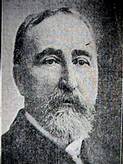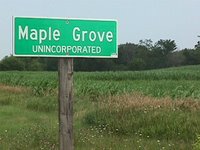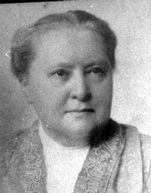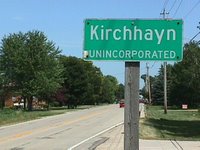Family Stories - Johannes Heinrich Jox

My great grandfather Jox - Johannes Heinrich Jox - was born in Rothges, Hesse-Darmstadt, Germany on December 18, 1831. His birth and christening are recorded in the Evangelical Lutheran Church of Wetterfeld, Hesse-Darmstadt, Germany. As he grew to maturity, he was expected to follow in his father's profession of weaving. However, his absorbing interest in books, mostly borrowed from the local minister, led him to rebel against his father's wishes. Instead of pursuing the trade of weaving he wanted to become a teacher.
In 1853 his pastor told him of the need in America for ministers to the growing number of German people here, especially those who had settled in the wilds of Wisconsin. He was 21 years old when he accepted that challenge. He arrived in New York on August 19, 1853 on the brig Hannover. That being a Sunday, the 94 passengers and cargo could not be unloaded until Monday, the 19th. He was listed on the passenger list as "H. Jox, age 21, male, a teacher, bound for Wisconsin."
He discovered upon arrival that the church would not accept him as a minister until he completed training at a seminary. To accomplish this, he agreed to go to the Lutheran Concordia Seminary in Fort Wayne, Indiana for the required training. After two years in Fort Wayne he was deemed qualified to be sent to the "spiritually starved" German people in Wisconsin and was assigned to the
 Maple Grove community in Manitowoc County where he was ordained by the St. Johns Lutheran Church there. That first assignment was not pleasant, and he soon became disgusted with the conditions under which he was forced to live. When his complaint reached the Lutheran authorities in Milwaukee, they suggested that he needed a wife, even picking the girl.
Maple Grove community in Manitowoc County where he was ordained by the St. Johns Lutheran Church there. That first assignment was not pleasant, and he soon became disgusted with the conditions under which he was forced to live. When his complaint reached the Lutheran authorities in Milwaukee, they suggested that he needed a wife, even picking the girl.
He married Augusta Marie Wille on March 30, 1856 in Milwaukee and immediately went back to Maple Grove. They moved into a small log cabin, but trying to deal with the hardships was still a bad situation. Indians were a constant threat. He was shot at on several occasions while riding around the area on horseback. Augusta had to carry water from a stream a half mile from the cabin. Getting the water became more intolerable when her first child was born and she had to carry the little girl with her for fear of the Indians stealing the baby. The couple endured all that misery for two years, then Henry insisted on a transfer. The little church in Maple Grove soon folded, and the building became a tavern. It was not long though before it burned to the ground and has never been reestablished.
It was in Kirchhayn, Wisconsin where the couple finally found some peace. In 1858, Henry became the pastor of the Immanuel Evangelical Lutheran Church in Kirchhayn and remained there for eight years. Kirchhayn is near the city Jackson, Wisconsin and remains an unincorporated village.

 After Henry left, a new stone church was built, and the old log church became a school. The church congregation continued for another 100 years before closing its doors due to lack of attendance. Both buildings have restored been and are now part of a museum of the area.
After Henry left, a new stone church was built, and the old log church became a school. The church congregation continued for another 100 years before closing its doors due to lack of attendance. Both buildings have restored been and are now part of a museum of the area.Three more children were born to the Joxes in Kirchhayn, including my grandmother, Augusta Wilhelmiene Katharina Jox. Henry's parents, Johannes and Elisabeth Jox, joined them from Germany in 1859 and remained with the family until their deaths. But, after 10 years of Wisconsin, Henry had had enough of the frontier. When an opening for a pastor arose in Logansport, Indiana, he was quick to answer the call. As the Civil War was approaching its end in 1865, Henry became the pastor of the St. James Lutheran Church in Logansport. He served there for 28 years until his death. In addition to serving St. James, he pastored several smaller churches in the area. He often told of meeting "scruffy looking" soldiers returning from the war as he rode his circuit.
Five more children were born in Logansport. He was very sentimental about his family. Although fond of his children, they were expected to live by very strict rules, never attending a theater, never playing cards, or doing anything that was frivolous or worldly. His income from the church was $30 per year plus the use of the parish house. People of the church supplemented this with gifts, often bringing sacks of corn or potatoes, meat, and other things. They always had a vegetable garden in the yard.
Henry's best friend in Logansport was the priest of the Catholic church. He died of carbunkles on the back of his neck in 1893 at the age of 62..

1 Comments:
Thank you for posting this informative biography. While pastor in Logansport, Rev. Jox performed the funeral for my great-great-great-grandmother, Marie Germann, at St. John's in Peru, Indiana, because her son, Rev. Charles A. Germann, was the pastor at Peru.
Post a Comment
<< Home